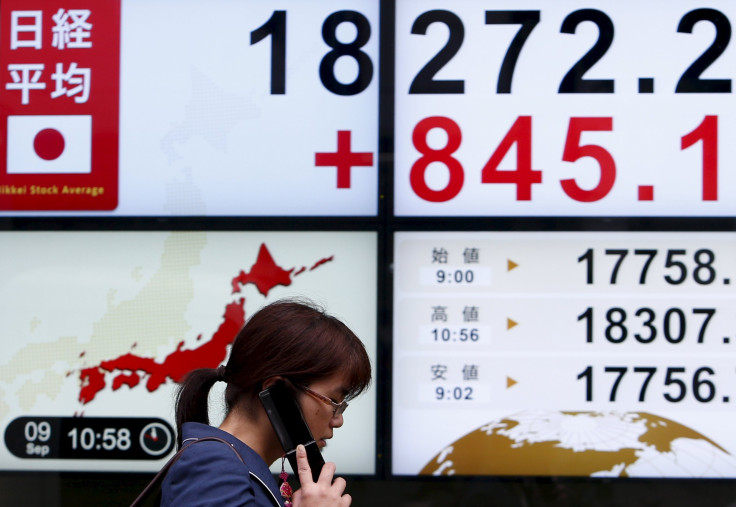Nikkei 225 Stock Index Up 7.7% In Biggest One-Day Gain Since October 2008

Japan’s Nikkei 225 Stock Average rose 7.71 percent to its highest level since October 2008. The rally was triggered by a mix of investors betting that a recent sell-off in stocks was overdone, and the promise of further tax cuts.
The Nikkei 225 closed at 18,770.51 – its highest level since Lehman Brothers Holdings went bankrupt at the height of the global financial meltdown – to recover the losses from Tuesday’s session, which had taken away all of the index’s gains in 2015. On Tuesday, Japanese shares witnessed a decline that was second only to the Shanghai Composite Index following the yuan’s devaluation in August, according to Bloomberg.
“The selloff in Japanese equities has been excessive amid concerns over China’s economic slowdown,” Khiem Do, Hong Kong-based head of multi-asset strategy at Baring Asset Management, told Bloomberg. “Today’s rally can be sustained once the market’s perception of the Chinese economy improves.”
Prime Minister Shinzo Abe said, according to Reuters, that his government plans to bring down the corporate tax rate by a total of 3.3 percentage points in the coming years.
Meanwhile, Wednesday’s rally in Japanese stocks was seen as a reversal of Tuesday’s losses and investors continue to watch China for further cues.
"With many markets having been sold off heavily over recent weeks, today’s rally, like the U.S. last night, represents a speculative bounce," Angus Gluskie, managing director of White Funds Management in Sydney, told Reuters.
Tetsuo Seshimo, a portfolio manager at Saison Asset Management Co. in Tokyo, told Bloomberg: “For now, it’s all up to what happens in China.”
In China, the Shanghai Composite was up 2.06 percent, after rising to 2.7 percent earlier in the day. On Tuesday, the Chinese government announced reforms to bolster fiscal policy, enhance spending on infrastructure and overhaul the tax system.
"We will accelerate the implementation and improvement of proactive fiscal policy and related measures, do timely fine tuning, and speed up reform measures to support stable growth and promote continued healthy economic development," a finance ministry statement reportedly said.
© Copyright IBTimes 2024. All rights reserved.






















